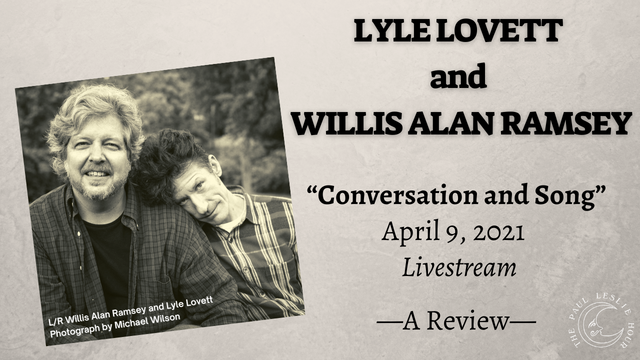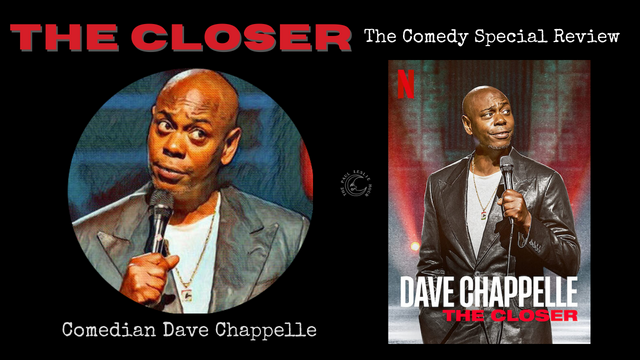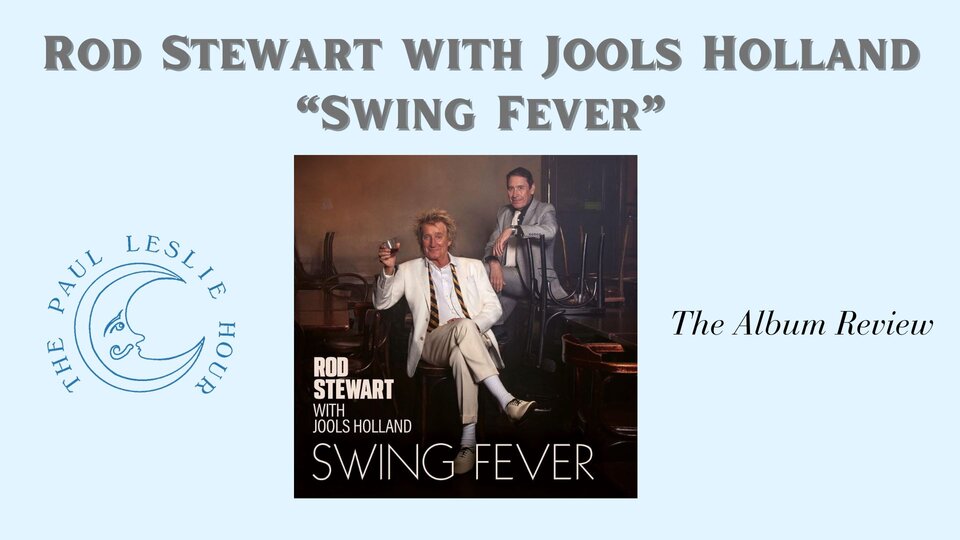On Friday, April 9th, I had the good fortune of watching a livestream of singer-songwriters Lyle Lovett and Willis Alan Ramsey “in conversation and song.” It was by far the best livestream video musical performance I’ve experienced.
Lyle Lovett and Willis Alan Ramsey find themselves in a very exclusive club of artists that really defy classification. Recording artists in varied genres have listed them as influences or covered their songs on albums or in live performances. Lovett and Ramsey both have an ability to find inspiration in the highly atypical. They can be sentimental and wry in the same song.
It figures they would be friends, having gone back to the 70s. In addition to mutual admiration, they’ve written together and have a lot of shared memories.
I had the opportunity to welcome both Willis Alan Ramsey and Lyle Lovett on my show, The Paul Leslie Hour. It was a longstanding wish and to interview them both in the same week was thrilling for me. Especially evident was the great reverence they hold for one another.
I knew for some time that the two would perform in one of Lyle’s livestreams. Anticipation is a good thing during these times we’re in. Settling in after enjoying Vietnamese takeout, I got comfortable. The minutes and seconds counted down on the screen, and finally the moment was at hand.
Production was top of the line
What immediately impressed me about the livestream was the great attention to detail. The production was impressive. Good microphones resulted in a clear, vibrant sound. The dark backdrop allowed the online audience to really focus on the performers.
From a technical standpoint, the performance was smooth and very user-friendly. Lovett has been using Seer, a company specializing in live video streaming technology. As far as streaming music performance, the broadcast quality was top-notch.
The show underway, Lyle is a great host. Gracious to the audience and good at making a connection. After introducing Willis, the evening began with one of Willis Alan Ramsey’s most celebrated songs, which he described as an “oldie, but a goodie.”
The evening started with a classic
This first song “The Ballad of Spider John,” appeared on his 1972 album “Willis Alan Ramsey,” and weaves quite a tale as told through the titular character. It’s a song that has captured the imagination of Jimmy Buffett and Sam Bush, who both recorded the song. There’s nothing like hearing Willis sing it. His rich voice is perfect for storytelling.
After performing the song, Lyle and Willis exchanged chatter. The conversation was relaxed, but very interesting, Willis calling Lyle “little brother.” That level of camaraderie is rarely witnessed.
The Uncle Walt’s Band Connection
There was something so pure about this livestream. It was a big-hearted performance that felt very much like visiting with friends. There was a lot of reminiscing. Lovett and Ramsey shared recollections of the late Walter Hyatt of Uncle Walt’s Band, a much beloved and influential band consisting of Hyatt, David Ball and the late Champ Hood.
The format was very simple, the two alternating performance of songs, with conversation in between. The discussion of Uncle Walt’s Band prompted Lyle’s first song of the evening “Once is Enough.” It originally appeared as the closing track of the album “Lyle Lovett and His Large Band,” and those in attendance were able to hear it performed solo.
He also sang the Walter Hyatt penned “Lonely in Love,” which appeared on Lovett’s album “Step Inside This House,” an album of all songs written by fellow Texans. Lyle’s plaintive singing can certainly leave you misty eyed. He dedicated the performance of the song to those associated with the band and in memory of Walter Hyatt and Champ Hood, and for David Ball.
The blues runs through their music
Both Lyle and Willis were influenced by blues music. The concert included Willis Alan Ramsey’s performance of “Mr. Lemon,” an unreleased song which he described as “kind of a traditional blues song.” The song succeeds in that idiom very well, and has a timeless quality.
Willis has a passion for a lot of kinds of music, and a deep respect of blues and roots music. It could be heard in his performance of “Watermelon Man,” another song appearing on his legendary 1972 album. I was thrilled to hear it live.
Lyle has the same authenticity as was evident in his performance of the humorous and somewhat self-referential cover of the Michael Franks song “White Boy Lost in the Blues.” The song appeared on the “Sonny & Brownie” record from Sonny Terry and Brownie McGhee. It’s the unexpected that has always been Lyle’s forte. Lyle covered it on his very eclectic 2012 album “Release Me.”
All of the songs were performed on guitar, with Ramsey’s performance of the bluesy “Sympathy for a Train,” also featuring the harmonica. Willie Nelson once told me, “I think there’s something about a train whistle in the middle of the night.” Ramsey’s song and vocal delivery captured that magnetism and even sound of a train.
The emotional performances drew you in
One of the highlights of the evening was Lyle’s performance of the wistful ballad “North Dakota,” which he called one of his favorites. The tune is one of the few co-writes in the Lyle Lovett discography, and appeared on the “Joshua, Judges, Ruth” album. It was written with Willis Alan Ramsey. The emotional performance made me forget that I wasn’t in a theatre watching it.
The livestream was a perfect pairing
Sometimes a perfect meal is because of how two foods perfectly accentuate one another. That’s how I felt about the evening I spent watching Lyle Lovett and Willis Alan Ramsey in conversation and song. It wasn’t just the music. It was a reminder of how important your friends are. These are two artists who impeccably fit one another.
There was laughter and a couple of times I found myself misty eyed. Of course just like you, I can’t imagine the many emotions of that first in-person live show. But this livestream eased that longing. That night, I forgot about all of the obstacles we are facing and was only thinking about the stories. I was completely satisfied.
If there’s ever been a litmus for whether a show was a success, I think that’s it.


